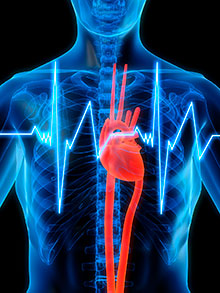Escitalopram May Reduce Risk of Heart Problems
Abstract
In addition to improved depression symptoms, patients who took 24 weeks of escitalopram after a heart attack/unstable angina had a reduced risk of additional heart attacks during an eight-year follow-up.
Many people develop depression in the aftermath of a heart attack or unstable angina. Although studies have shown that depression can lead to poorer outcomes in patients following such acute coronary syndrome (ACS) events, few studies have examined the long-term effects of antidepressants on this patient population.

A study published in the July 24/31 issue of JAMA provided some of the first experimental evidence that treating patients with depression following an ACS event with escitalopram can reduce the risk of heart problems.
Jae-Min Kim, M.D., Ph.D., of Chonnam National University Medical School in the Republic of Korea and colleagues tracked the long-term outcomes of 300 patients who had received 24 weeks of escitalopram (flexibly dosed at 5 mg to 20 mg/day) or placebo following an ACS event.
As the researchers previously reported, patients who took escitalopram had lower depressive symptoms than those who took placebo at 24 weeks. For this new study, they continued to monitor the cardiovascular health of these patients for an additional eight years on average.
At the end of the follow-up period, 61 patients (40.9 percent) in the escitalopram group and 81 patients (53.6 percent) in the placebo group experienced a major cardiac event. Major events were defined as cardiac-related death; death from any cause; heart attack; or having a percutaneous coronary intervention (PCI), a medical procedure to open narrow arteries.
When looking at individual cardiac events, the researchers found a significant reduction in the occurrence of heart attacks: 8.7 percent of patients in the escitalopram group had a heart attack compared with 15.2 percent in the placebo group, a greater than 40 percent reduction. There were no statistical differences in mortality or rates of PCI between the groups.
Two previous randomized clinical studies had failed to find any long-term cardiovascular benefits to post-ACS antidepressant therapy. The researchers noted, however, that one of these studies only followed patients for about 18 months, which may be too short a time. The other study followed patients for nearly seven years, but only measured differences in mortality in patients who received antidepressants with those who did not. Similar to this study mortality was not found to be different between the two groups.
“This is the strongest evidence so far that antidepressants might improve cardiovascular prognosis in addition to depressive symptoms,” said Peter Shapiro, M.D., a professor of psychiatry and director of the Consultation-Liaison Psychiatry Service at Columbia University Medical Center.
Shapiro told Psychiatric News that it is premature to interpret these findings to mean that selective serotonin reuptake inhibitors such as escitalopram should be the preferred option for ACS patients who have depression.
For one, the study did not compare patient outcomes after receiving escitalopram therapy to other treatment options like a stepped care approach that starts the patient with brief psychotherapy and careful monitoring.
Second, while Shapiro noted this was the strongest data to date, it still had limitations. The study size of 300 was a bit small, and since all the participants were Korean the findings may not be applicable to all populations. Shapiro also said the screening procedure was unusual; this study recruited patients who were hospitalized up to two weeks following an ACS. He noted that it would be rare to have someone in the United States be an inpatient that long following a heart attack.
This study was funded by the National Research Foundation of Korea. H. Lundbeck A/S provided the escitalopram for the study. ■



